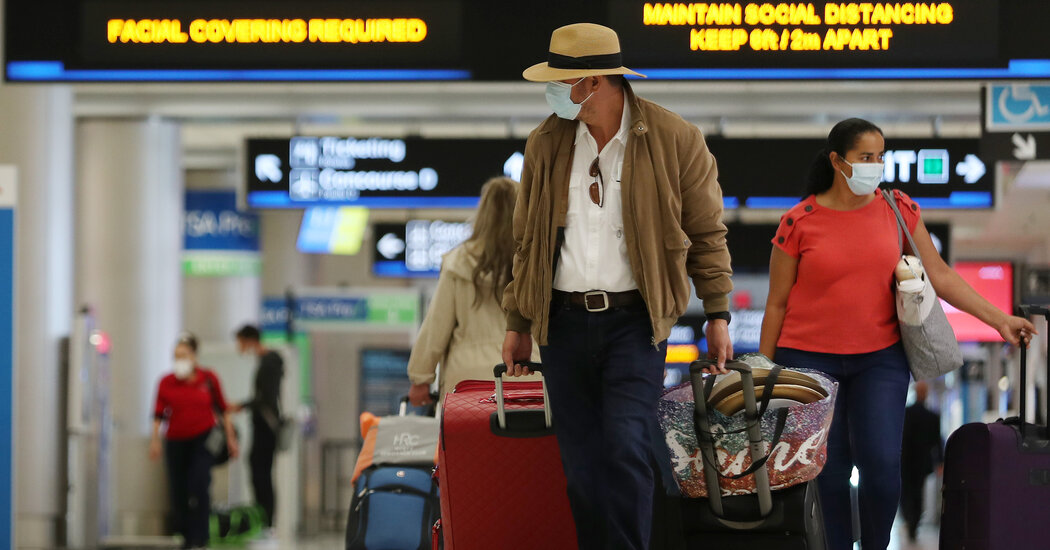Health officials may be bracing for the Omicron variant to sweep through the country, but the Delta variant remains the more imminent threat as it continues to drive an increase in hospitalizations.
Health care workers said their situations had been worsened by staff shortages brought on by burnout, illnesses and resistance to vaccine mandates.
More than 55,000 coronavirus patients are hospitalized nationwide, far fewer than in September, but an increase of more than 15 percent over the past two weeks, according to a New York Times database. The United States is averaging about 121,300 coronavirus cases a day, an increase of about 27 percent from two weeks ago, and reported deaths are up 12 percent, to an average of about 1,275 per day.
Michigan, which now leads the country in hospitalizations per capita, announced last month that the federal government was sending health care workers to support some hospitals. On Wednesday, Vermont had a record of about 90 people hospitalized with Covid-19, according to the state’s health department. And cases and hospitalizations are rising fastest in Connecticut, which recorded a 69 percent increase in patients in the past two weeks.
Even states that rank among the highest in vaccination rates are struggling, like Maine, where about 73 percent of the population is fully vaccinated, behind only Vermont and Rhode Island, according to a New York Times database. Cases in Maine recently reached their pandemic peak.
On Wednesday, with Maine’s hospitals straining, Gov. Janet Mills activated as many as 75 members of the state’s National Guard to help. The Guard members, she said, would support nursing facilities and administer monoclonal antibodies, which help prevent serious illness.
“I do not take this action lightly,” Ms. Mills said in a statement. “But we must take steps to alleviate the strain on our health care system and ensure care for all those who need it.”
Maine Medical Center, the state’s largest hospital, said in a statement on Wednesday that there had been times this week “when there were no critical care beds available,” forcing hospital leaders to postpone surgeries.
“We are caring for an unprecedented number of patients,” the hospital said.
Gov. Chris Sununu of New Hampshire took similar steps Wednesday, saying at a news conference that 70 National Guard members in his state would be deployed in the next few weeks to help the state’s straining hospitals with nonmedical functions like food service and clerical work. On top of that, the governor said, the Federal Emergency Management Agency was dispatching a team of 24 people to assist the hardest-hit facilities.
New York State turned to National Guard troops last week to help reinforce overburdened nursing homes around the state. Gov. Kathy Hochul had issued what she called “a pre-emptive strike” ordering that roughly 30 hospitals nearing their capacity stop performing elective surgeries to make space for acute cases. The restrictions, which are intended to avoid the chaos that New York saw in the spring of 2020, will mostly impact hospitals upstate.
“We continue to see an uptick in hospitalizations. This is what keeps me up at night,” she said at a news conference on Thursday, even as hospitalizations remained much lower than the highs of last winter or the previous spring.
In Missouri, officials are reporting burnout among health care workers.
Dr. Raghu Adiga, the chief medical officer at Liberty Hospital in Liberty, Mo., said on Wednesday that his staff was frustrated with those who were unvaccinated because they were driving this latest surge.
“They’re going to have to help us help them,” Dr. Adiga said.
More than 1,600 people in Missouri were hospitalized with Covid as of Wednesday, compared with about 980 on Nov. 8, data shows.
Missouri’s University Health hospital system had 10 people hospitalized with Covid in early November, said Dr. Mark Steele, the system’s chief medical officer. On Wednesday, there were 39.
“What we’re seeing now is still overwhelmingly the Delta variant,” Dr. Steele said, adding that now, there are “concerns about Omicron” to think about.
Grace Ashford contributed reporting.
